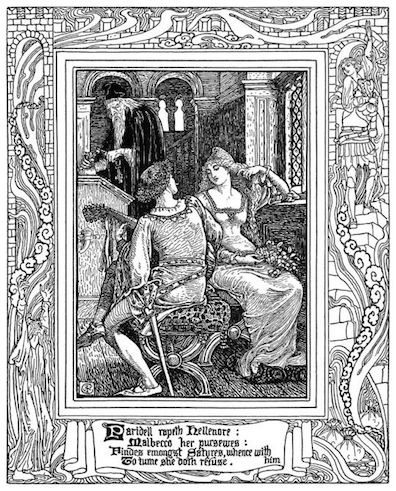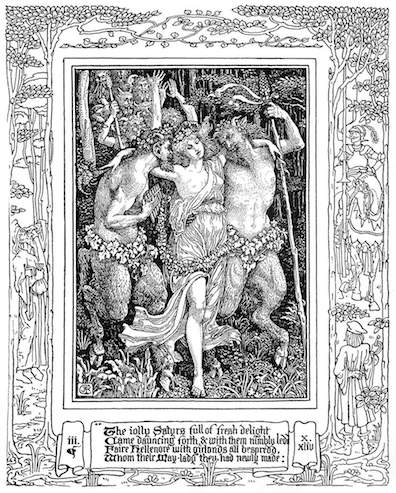As Bloom raises the window blind in the bedroom he keeps his
peripheral vision trained on Molly's perusal of the mail: "his
backward eye saw her glance at the letter and tuck it under
her pillow." Although the verbal connection is slight, Gifford
is almost certainly correct to hear in this sentence an echo
of Edmund Spenser's cuckold Malbecco, who cannot escape the
awareness of his wife's infidelity: "Still fled he forward,
looking backward still."
In book 3, canto 10 of Spenser's The Faerie Queene
(1590), Malbecco is a miserly and jealous man who perpetually
suspects his wife Hellenore of infidelity. She responds by
running off with a flashy knight named Paridell, who abandons
her after having his sexual fill, "For having filcht her bels,
her up he cast / To the wide world, and let her fly alone, /
He nould be clogd. So had he servèd many one" (stanza 35).
Hellenore, left to her own devices, enacts an adult version of
Snow White by moving in with a band of satyrs, "With them as
housewife ever to abide, / To milk their gotes, and make them
cheese and bred, / And every one as commune good her handelèd"
(36).
Looking for his wife, Malbecco runs into Paridell and,
"almost dead with feare," greets him fairly; Paridell tells
him that he no longer cares for Hellenore and that she is
living somewhere in the forest (37-38). Concerned for his
wife's safety, Malbecco plunges into the forest and finds
"Faire Hellenore, with girlonds all bespred, / Whom their
May-lady they had newly made" (44). When night comes, all the
satyrs kiss Hellenore. Malbecco creeps closer, his sprouting
cuckold's horns making him indistinguishable among the goats,
and watches her current partner perform:
At night, when all they went to sleepe, he vewd,
Whereas his lovely wife emongst them lay,
Embracèd of a Satyre rough and rude,
Who all the night did minde his joyous play:
Nine times he heard him come aloft ere day,
That all his hart with gealosie did swell;
But yet that nights ensample did bewray,
That not for nought his wife them loved so well,
When one so oft a night did ring his matins bell. (48)
Malbecco wakes his wife in the morning and tries to persuade
her to return with him, all her trespasses forgiven. She
refuses and he ignominiously retreats, at first on hands and
knees with the goats, and then rapidly on foot: "Still fled he
forward, looking backward still" (56). At
last he throws himself off a cliff to die, but jealousy has
wasted his substance to nothing and he becomes a purely
allegorical monster named Gealosie.
Bloom is neither a miser nor pathologically jealous, but
other details of Malbecco's story fit his situation all too
well. The satyr's sexual prowess, which shows clearly "That
not for nought his wife them loved so well," has obvious
relevance to Boylan's ability to satisfy Molly repeatedly in a
way that Bloom can no longer manage even once. And Malbecco's
timidity before Paridell makes a reader think of Bloom's
inability or unwillingness to confront Boylan. Bloom's
complicity in the adultery, and Molly's evident desire to have
him know what she is doing, are captured in the moment when
she very ineffectively conceals
Boylan's letter while he simultaneously looks away and gives
her "his backward eye," in a kind of sorry
inversion of the wish-fulfillment principle.

